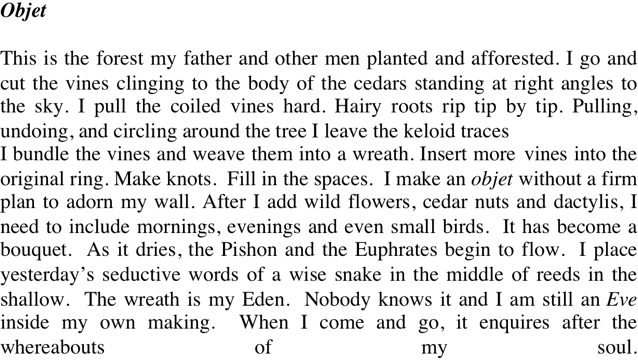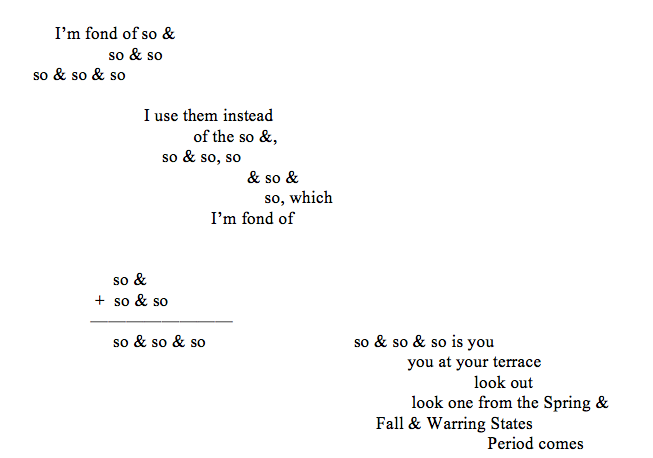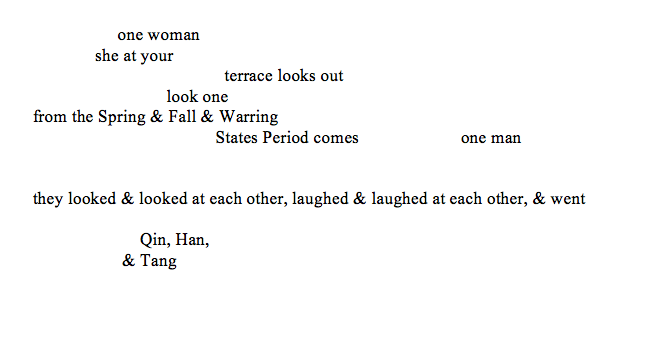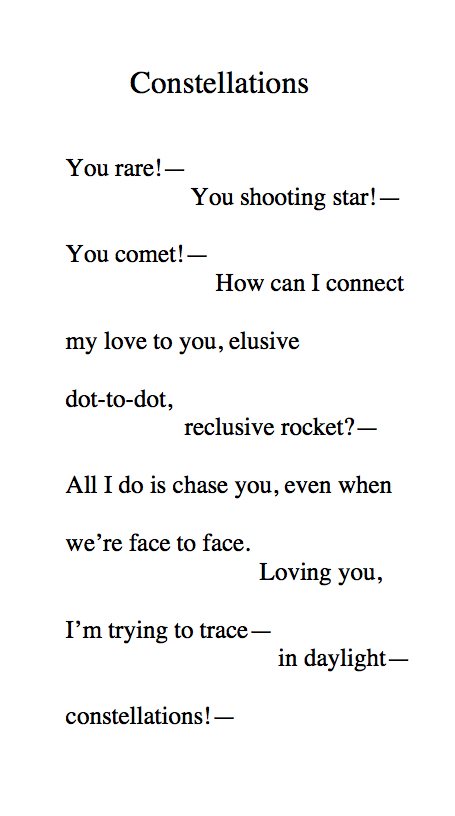Screenwriter and novelist Ning Dai was born in Tianjin, and graduated from the Beijing Film Academy in 1989. Her films include 找乐 (For Fun) and 警察日记 (Police Diary). In 2006 she won Best Screenplay Adaptation for 看上去很美 (Little Red Flowers) at the 43rd Golden Horse Awards in Taiwan.
Nyuk Fong Parker is a literary translator based in the USA.
Lessons
Throughout the course of my education from primary to secondary school, two math teachers stand out in my memory. One of them was Mr Liu Kezhi, who began to teach us during our second year at middle school. The other was Mr Li Deyu, who taught us in our second year of high school. Mr Li had been Mr Liu’s teacher, but they had completely different teaching styles.
Mr Liu’s first day of teaching was the start of a new school year. My classmates and I had spent recess chatting. When the bell rang for the lesson to start, Mr Liu appeared at the classroom door. At that moment, we all guessed that he was the new math teacher. However, the bell had not yet stopped ringing, and the teacher had not come into the classroom, so we seized the opportunity to carry on talking. Suddenly, something dawned on us. One by one we fell silent. The bell had stopped ringing. Why had the teacher not said anything? Why hadn’t he come into the room? He was still standing in the doorway. I looked at him. He was watching us sternly. His eyes swept over us, row by row and one by one. Tall, slender, and dark, he was wearing a slightly faded navy-blue Chinese tunic suit. The math book in his hand was rolled into a small bat, which he was rubbing. As soon as silence had fallen, Mr. Liu finally walked in, not saying a word. He threw his book on the desk and said, “Let’s begin.” He did not mention his long wait outside the classroom. From then on, he was exactly the same every day, not changing his outfit, expression, look, or demeanour. I couldn’t remember when it started, but we changed. Whether the bell was ringing or not, when we saw Mr Liu at the door, we stopped talking straight away.
Mr. Liu had another distinctive feature. During class, he would never say anything that wasn’t related to math. When he opened his mouth, it was to talk about the lesson. He never looked at his text book. It always lay rolled up on the desk, and he took it away when class was over. He also never criticized a student by name. He had a special trick, pinching the chalk in his hand until it was as thin as a pill, and accurately shooting it in the direction of his target. If a student talked in class without permission or made inappropriate gestures, Mr Liu would stop the lesson, take a piece of chalk, and flick it at the student, then stare at the culprit without a word. He would only continue with the lesson when the errant student realised their mistake and corrected it. Once, my deskmate and I were playing with carbon ink. A piece of Mr Liu’s chalk landed squarely in the ink bottle. My friend and I were astonished at the accuracy of our teacher’s aim. As we watched the chalk bubbling in the ink, we couldn’t help but laugh. Mr Liu continued to stare at us. His sternness stopped our laughter. I closed the lid on the ink bottle tightly, but Mr Liu didn’t continue with the lesson. He was eyeing the ink bottle. We had no choice but to put it into the desk drawer. We never took it out again during class.
I was very fond of Mr Liu. I started to like him the first time he gave us homework. He asked us to complete it on math paper, folded in the middle, as if doing crafts. We were to use an angle ruler and a pair of compasses to draw on it or write questions, answers, laws, and theorems, as if we were writing a composition. It was fun. Thanks to Mr Liu, I discovered that math homework could be easy and enjoyable. I forgave him for his serious words and manner.
My deskmate liked to chat with teachers. I was never able to do this; I studied music and art outside of class, so I had to fit my homework in during class time. She often told me that Mr Liu was praising so-and-so for making great improvements, and said so-and-so had a talent for math but was not careful enough. I looked forward to a word of praise from Mr Liu, but it never came. He tended to compliment students who raised their hands for the first time in class. When I thought about that, I felt as if I had seen Mr Liu’s private smile.
I didn’t know Mr. Liu’s full name at secondary school. I was at the stage when I felt no need to know what teachers were called outside of class. Just calling him “Mr Liu” was enough; everyone would know I was referring to my math teacher.
Now that I think about it, learning math from Mr Liu enriched my life in major ways. I not only began liking the subject, but – more importantly – I learned the meaning of self-awareness, even though he never taught it directly. All he did was wait patiently, tenaciously, for us to develop it on our own.
Our math teacher at high school was Li Deyu. It was my deskmate who told me that he’d been Mr Liu’s teacher as well. This was some consolation; I still missed Mr Liu.
Mr Li was very different, both in his bearing and in the way he taught. He was a lot older than Mr Liu, and always wore a blue mandarin jacket – a rare sight in Beijing’s secondary schools during the 1970s. When Mr Li came into the classroom each day, he would open his textbook earnestly and turn to the lesson. He would then place a long wooden ruler on the desk to hold the page down. While he taught, he would turn the pages for an occasional look. When the class was noisy, he would use the ruler to rap the desk or black-board.
The fact that Mr Li had been Mr Liu’s teacher was also visible in one habit. Like his student, Mr Li would never target a student by name for criticism, no matter how big their mistake. But he never stopped talking. He liked to comment on everything that happened, talking about his childhood and the Christian School he had attended. He remarked upon everything he saw. He had a smooth intonation and casual expression, but never held back with a joke or a cutting riposte. For instance, he would suddenly stop in the middle of a lesson and tell us a lively anecdote about his younger days. Apparently, the reason he’d enjoyed festivals as a child was because he liked the peddlers who wove through the streets, calling out their wares while they beat their wave drums. He always looked forward to the sound of those drums. The wave drum is small and round, with two small balls tied to its side. As the peddler shook the drum, the sound rang out in a jagged rhythm.
As he told these tales, we would all listen, entranced. But Mr Li would change the subject abruptly, to teach us a lesson about classroom distractions. Students nowadays, he said, were always turning their heads to chat with their friends during lessons.
Each day, after Mr Li had reviewed our homework, he would describe plays he had attended during his childhood, bustling with the noise and excitement of the theatre. His favourite dramas had military themes. He had seen actors with poor technical skills who could not execute their moves well, messing up their face makeup with a sweep of their long sleeves, appearing more like clowns than martial artists. Mr Li compared this to our messy homework notebooks. It was always fun to listen to him in class; he always raised a laugh. I looked forward to math class as if waiting to watch a cross-talk show.
My strongest memory of Mr Li is his fondness for the English phrase “lazy bones.” The first time I heard him use it was when a student was late coming to class. Mr Li stopped the lesson and watched, expressionless, as the student took his seat. Then, he asked if any of us knew how many bones we had in our bodies. As we were guessing and counting, he uttered the words “lazy bones.” He knew we were learning Russian, so he started explaining that the English language was figurative as well. To describe someone as lazy in English, there was no need to say it directly; it was enough to say that his bones were lazy. He’d learned it at the Christian school he had attended. Lessons there were taught in English, and latecomers were always labelled “lazy bones”. We all laughed when he told us. From then on, whenever someone was late for class, I would look at Mr Li, waiting for him to say it. I didn’t dare to be late, partly because I was afraid of being called “lazy bones”, but mostly because I enjoyed his “cross-talk” so much.
Later, when I came into contact with English through my work, I asked a colleague to teach me how to write Mr Li’s pet phrase. My colleague was confused. She thought it came from a Chinese saying. I didn’t believe her, and finally found it in a dictionary. It was only then that I understood its true meaning: Mr Li had been cautioning us not to waste or neglect even a moment of our lives.
After I graduated from high school I never saw Mr Li again, and I never will – he has passed away now. However, about five or six years after I left school, I saw a picture of him in the Beijing Daily. A friend from secondary school called me, saying that a piece had been written about him. After he retired, he had volunteered his services to teach math to soldiers in the armed police force. I found a copy of the newspaper, and there was my Mr Li – his usual amiable self, still working, even in retirement. My friend and I talked about visiting him, but we never got around to it due to our busy schedules.
After another five or six years, I was studying overseas. Just before I came back to China I had a dream about a small art exhibition. Mr. Liu was there, wearing his usual solemn expression. He seemed to be narrating something, guiding me further into the exhibition hall. In the middle of the deepest part of the hall was Mr. Li. He was standing in front of a large portrait of himself, rattling off humorous, sparkling patter. The effect was different from his classroom discourse. His audience were not laughing. When I woke up, I realised I’d been dreaming in black and white. A thought struck me. I knew I had to visit Mr Li when I returned to China. A month after I got back, I called my old deskmate, who was now a math teacher. She told me that Mr Li had passed away from an illness two months earlier. I had lost my chance. I had neglected him, but what I’d wanted to tell him was this: I had never neglected a single moment of my life since leaving secondary school. That was the lesson he had taught me.
I have never forgotten Mr Liu and Mr Li. My respect for them has lasted throughout my life. One of them taught me to be aware of myself; the other taught me never to be lazy. They were brilliant teachers, but the education they gave me was more than mathematics. What they taught me will benefit me for life. It had nothing to do with numbers.
(Originally published as《我的两位数学老师》in《心理月刊》in October 2012)
Continue reading





